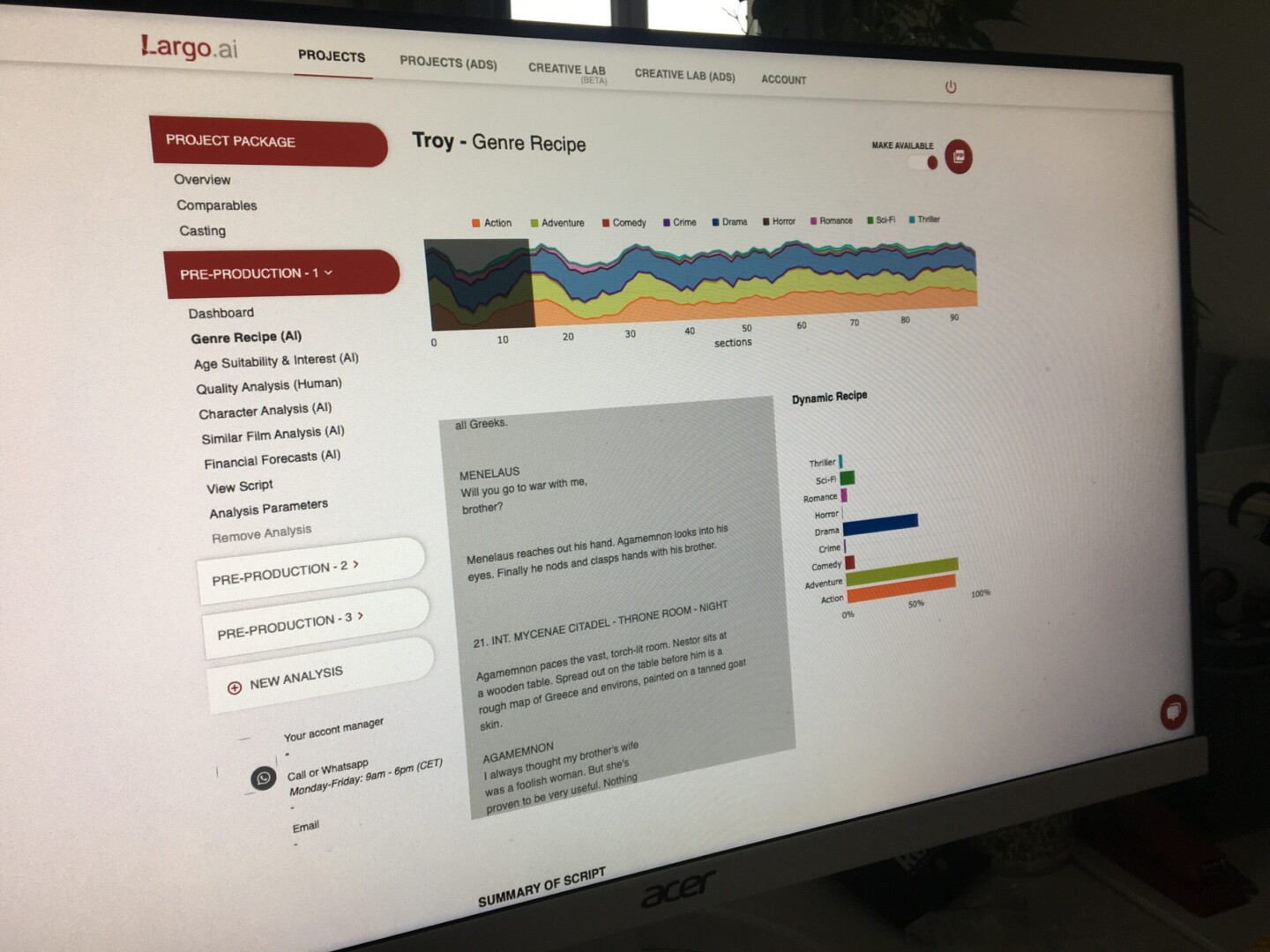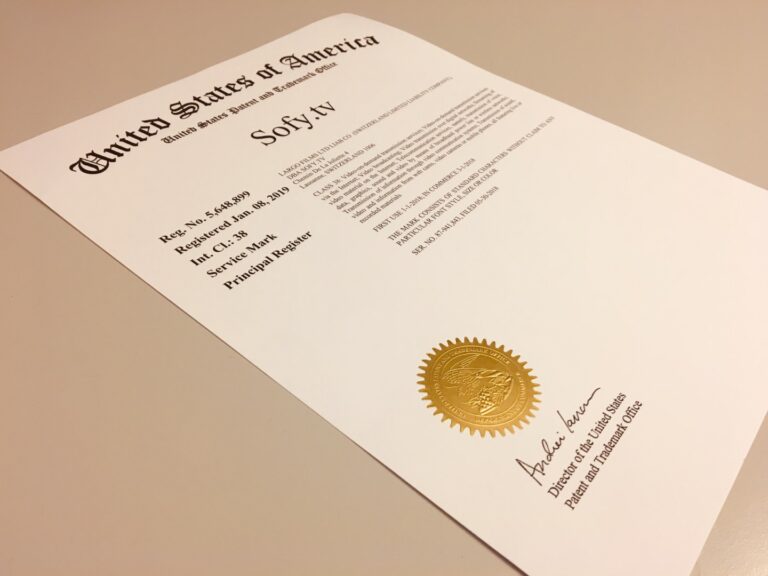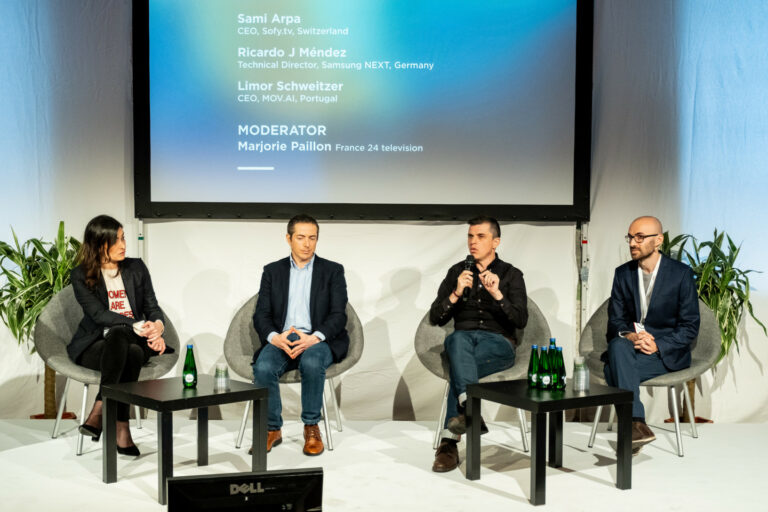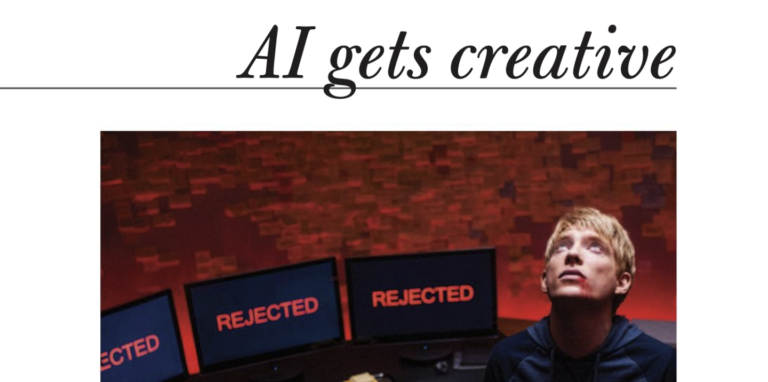After it was announced that Media Desk Suisse had kindly offered European film producers an opportunity to tryout AI-assisted moviemaking, more than 200 producers rushed to sign up. In total, 20 European independent production companies were selected to trial Swiss AI-assisted filmmaking company Largo.ai’s cutting-edge artificial intelligence technology.
The results were announced in a recent online workshop entitled “Boosting European Movies through Artificial Intelligence”. Here is a summary of what they were.
The Numbers
Largo.ai CEO Sami Arpa began the proceedings by providing a brief breakdown of the demographics of the producers who took part and the amount of movies analyzed. These were as follows:
- 22 Producers took part
- Representing 9 European countries
- 80 movies analyzed
- 216 total analysis (which includes all newer or different versions analysis)
- Trail began in August 2020 and concluded in February 2021.
Result’s Analysis
When it came to Largo.ai’s interpretation of the dominant genre of each film, the producers agreed with its findings 80% of the time, something with validates the high level of accuracy achieved by the system.
However, when it came to age suitability analysis, Largo.ai disagreed with the producers’ interpretation of the correct age range 60% of the time.
Arpa explained that this difference was down to the producers generally selecting all suitability age ranges for their films versus Largo.ai’s identification of only the most dominant age group(s).
This, Arpa highlights, is a normal process for producers who normally consider as wide an age range as possible due to the “advantages in finance and marketing” this brings, while the AI program is seeking only to find the most dominant suitable age groups in a correct way.
Due to the ongoing Covid-19 pandemic, the results of the movie financial forecasts or ‘gross earnings predictions’ could not be compared with accurate earnings. However, the results did predict an increased ‘Average predicted gross’ of 53% between the first analysis and subsequent changed or more developed versions of the content by using the insights provided by AI.
What the Producers Thought of Largo.ai
Producers Judith Lichtneckert and Sophie Erbs were selected to give their valuable insights into what they thought of artificial intelligence in the moviemaking process.
Sophie Erbs began by stating that this was the first time she had used artificial intelligence tools, joking that until now they had been using “human intelligence.” Expanding her answer on why she decided to try out AI, she stated that she was “very curious to see the way that it works and whether it was something that we could use as a weapon to keep doing what we stand for, in our independent way of doing things.”
Judith Lichtneckert agreed with Erbs’ viewpoint, also stating that this was her first time trialing AI filmmaking tools. “I was interested to find out how it works, what it can do… how far it can go, what sort of spectrum is it for, is it only for mainstream or can it be used for European arthouse movies as well.”
Lichtneckert began her analysis by saying “I was surprised by a couple of features and how far it goes, and what you can do with it, before going onto later specify that “I have a couple of projects in preproduction, it really gives us interesting tools to analyses the script, to give you visualizations about character analysis, relationships, character appearances… to look at the structure of the script and why something works or doesn’t work.”
She concluded by saying that “it doesn’t give you the solutions, so your skills are absolutely necessary in order to analyze or do something with it, there is no solution there for any problem.”
This observation is very common and one that refutes one of the main accusations against AI, that it will reduce creativity by taking control of the decision-making process.
Erbs explained her interest in AI moviemaking tools, “I was particularly interested in seeing the financial analysis, for different films, whether they were in the post and preproduction. For me, this was the place where it could tell me more because I am working on new markets on certain types of films that I have never done before.”
Both producers were very impressed at the overall experience of using AI-assisted moviemaking tools to supplement their normal decision-making processes. However, they agreed that there is still work to be done.
When asked if there were any features that “weren’t really there yet”, both producers highlighted that elements such as the emotional analysis still required development. Such insights are invaluable in the development of complex AI systems and are the reason such trials are invaluable to AI developers.
Concluding, Erbs made the very valid observation that “I believe that the European film industry help in shaping it (the AI system)” is vital so that filmmakers can use it to “still offer something that is original, and at the same time to reach an audience that is as wide as possible so that their voice can be heard.”
While AI systems are already being proven to be powerful tools in helping producers and filmmakers understand their audiences better, there is still a lot of work ahead. This trial highlights the underlying desire for such tools by producers and their intrinsic value to the filmmaking process.
Erbs point regarding the need for industry participation core to whether AI can be successful in democratizing AI filmmaking, and to ensuring that it provides all segments of the global movie industry the insights that it needs to provide better and better films to its audiences.
Will Producers Keep Using AI?
Summarizing the overall success of this AI filmmaking trial, Arpa concluded his breakdown of the results by providing a breakdown of what percentage of producers said that they would continue to use AI.
- 60% of producers said that they would continue to use AI.
- 20% stated they might continue using it but not at the current time.
- 20% didn’t think they would use AI again.
To watch the complete webinar on The Use of AI in European Movies, click this link.
After it was announced that Media Desk Suisse had kindly offered European film producers an opportunity to tryout AI-assisted moviemaking, more than 200 producers rushed to sign up.




